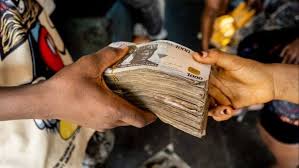The naira began the new trading week on a weak note as it exchanged at ₦1,533.67 to one United States dollar at the Nigerian Foreign Exchange Market, according to figures published on the official website of the Central Bank of Nigeria (CBN). This was a slight dip when compared to Friday’s closing rate of ₦1,532.51 per dollar, reflecting a 0.08 per cent depreciation in value.
During the trading session, the naira reached an intraday high of ₦1,535 per dollar while the lowest rate recorded was ₦1,532 per dollar. The movement came at a time when Nigeria’s external reserves were reported at $40.72 billion as of last Wednesday, showing some level of stability in the country’s reserve position.
At the parallel market, also known as the black market, the local currency closed stronger at ₦1,543 per dollar. This was slightly better compared to the average exchange rate of ₦1,545 per dollar recorded last week. Analysts believe this shows some short-term improvement in demand and supply balance, although speculative trading remains a risk in the informal market.
Market watchers had earlier projected that the naira would remain mostly stable at the official market this week, supported by continued intervention from the CBN and improved foreign exchange inflows. The apex bank has been actively supplying dollars into the market in order to maintain liquidity and ease pressure on the local currency.
However, some analysts have also warned that certain global factors may limit the strength of the naira in the short term. They noted that a stronger United States dollar, combined with falling crude oil prices, could create headwinds that might slow down any significant gains for the Nigerian currency. Cowry Research, in its latest market outlook, explained that barring major global shocks, the naira should remain steady in the coming days, although external factors may exert intermittent pressure. The report added that speculative activities in the parallel market could also determine whether rates remain unchanged or experience sudden swings.
In its weekly market update, AIICO Capital disclosed that the Central Bank of Nigeria sold about $166 million in the past week to sustain liquidity in the system. The firm stated that in the short term, it expects the foreign exchange market to maintain relative stability, aided by the central bank’s continuous policy refinements and fiscal measures introduced to support the economy.
Cordros Capital Limited also expressed optimism in its note to investors. The investment firm highlighted that foreign portfolio inflows are likely to continue due to carry trade opportunities, which have made Nigerian assets attractive to some global investors. The firm further pointed out that improved non-oil exports and reduced incentives for naira speculation are expected to encourage steady inflows from domestic sources, thereby reducing volatility.
Over the past year, Nigeria has been facing currency volatility caused by weak oil revenues, inflationary pressures, and rising demand for foreign exchange. To address these issues, the CBN has rolled out several reforms aimed at improving transparency in the forex market, attracting more dollar inflows, and reducing dependence on speculative trading.
The current trend suggests that while the naira is under pressure, there are efforts to manage the situation to avoid sharp depreciation. The stability of Nigeria’s currency remains closely tied to crude oil prices, foreign investment inflows, and the effectiveness of CBN’s interventions. With external reserves still above the $40 billion mark, analysts say the central bank has some room to continue supporting the naira, though challenges from global financial markets remain a concern.
The outlook for the naira in the short to medium term will depend on how Nigeria balances its foreign exchange inflows with demand, as well as how government policies address the country’s wider economic issues. For now, experts maintain that steady inflows from both foreign and domestic sources, along with CBN’s policy direction, will be key in sustaining confidence in the local currency.
